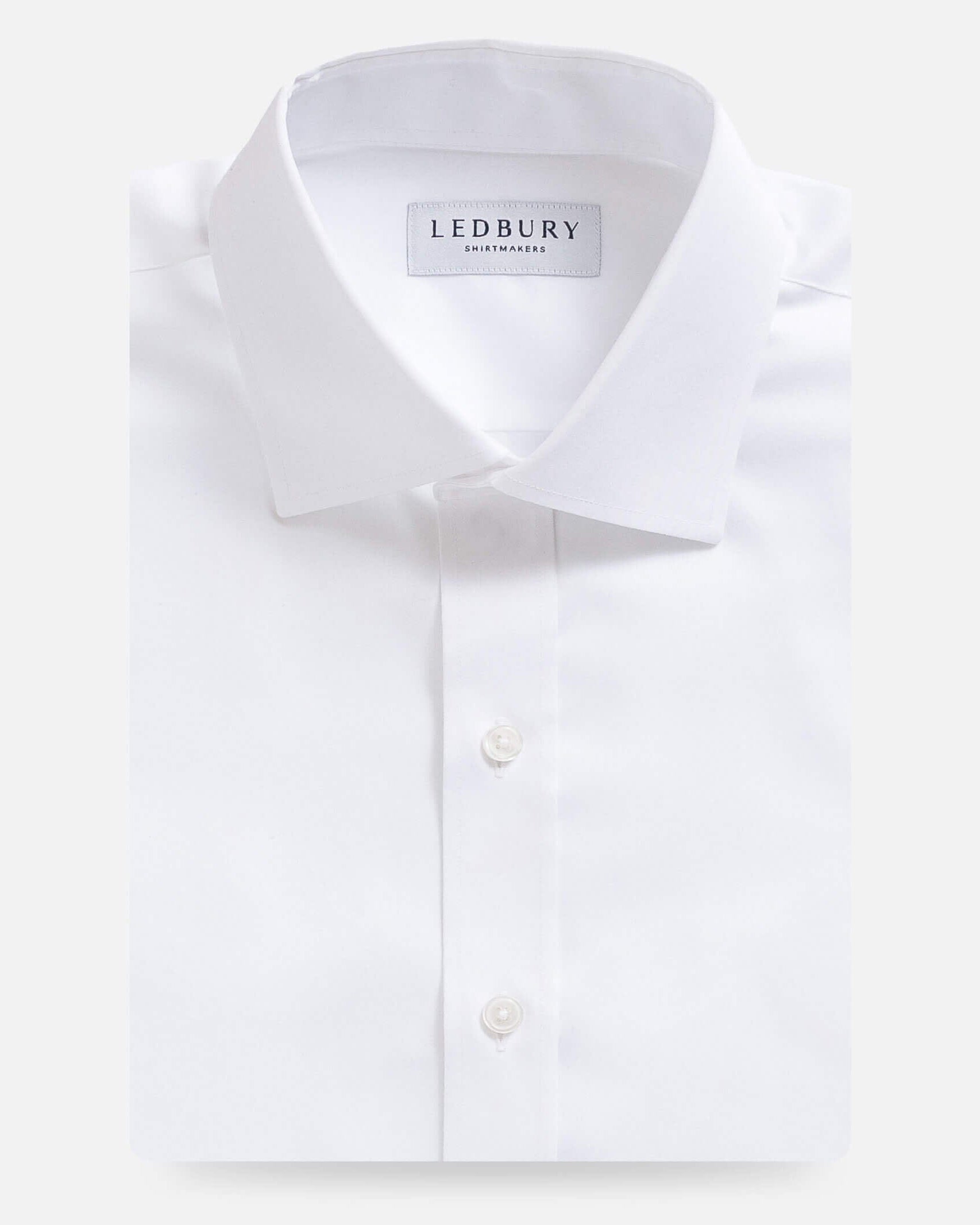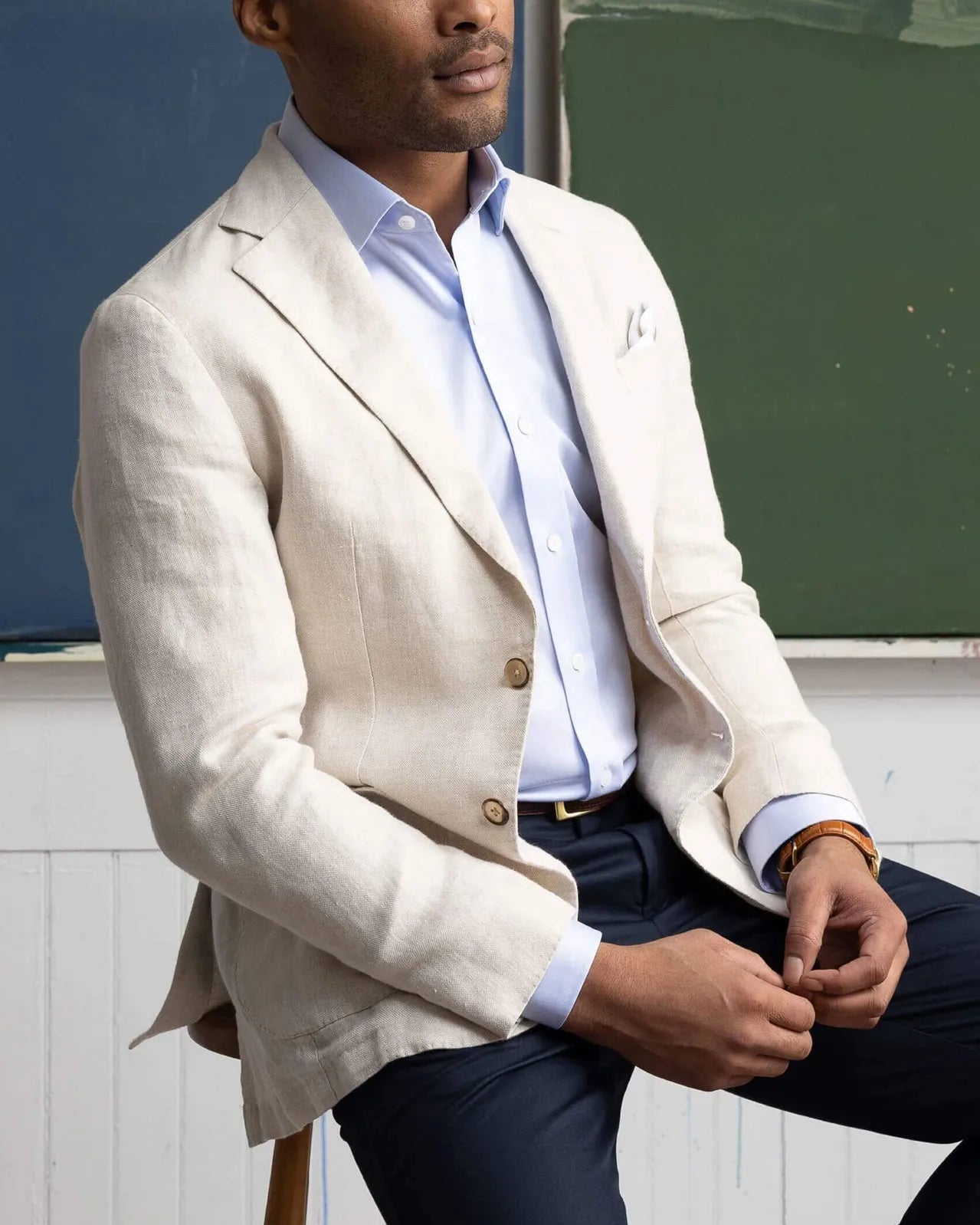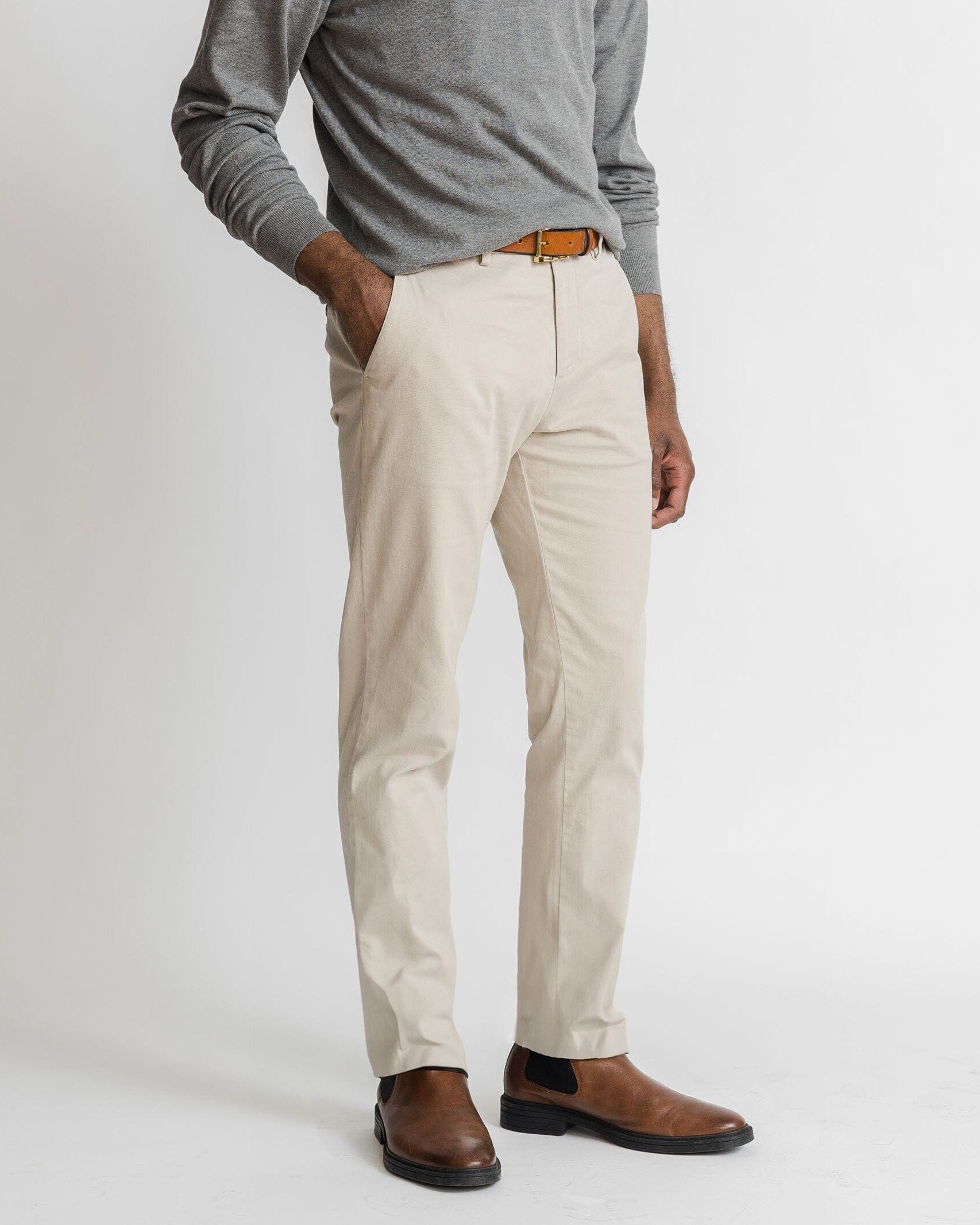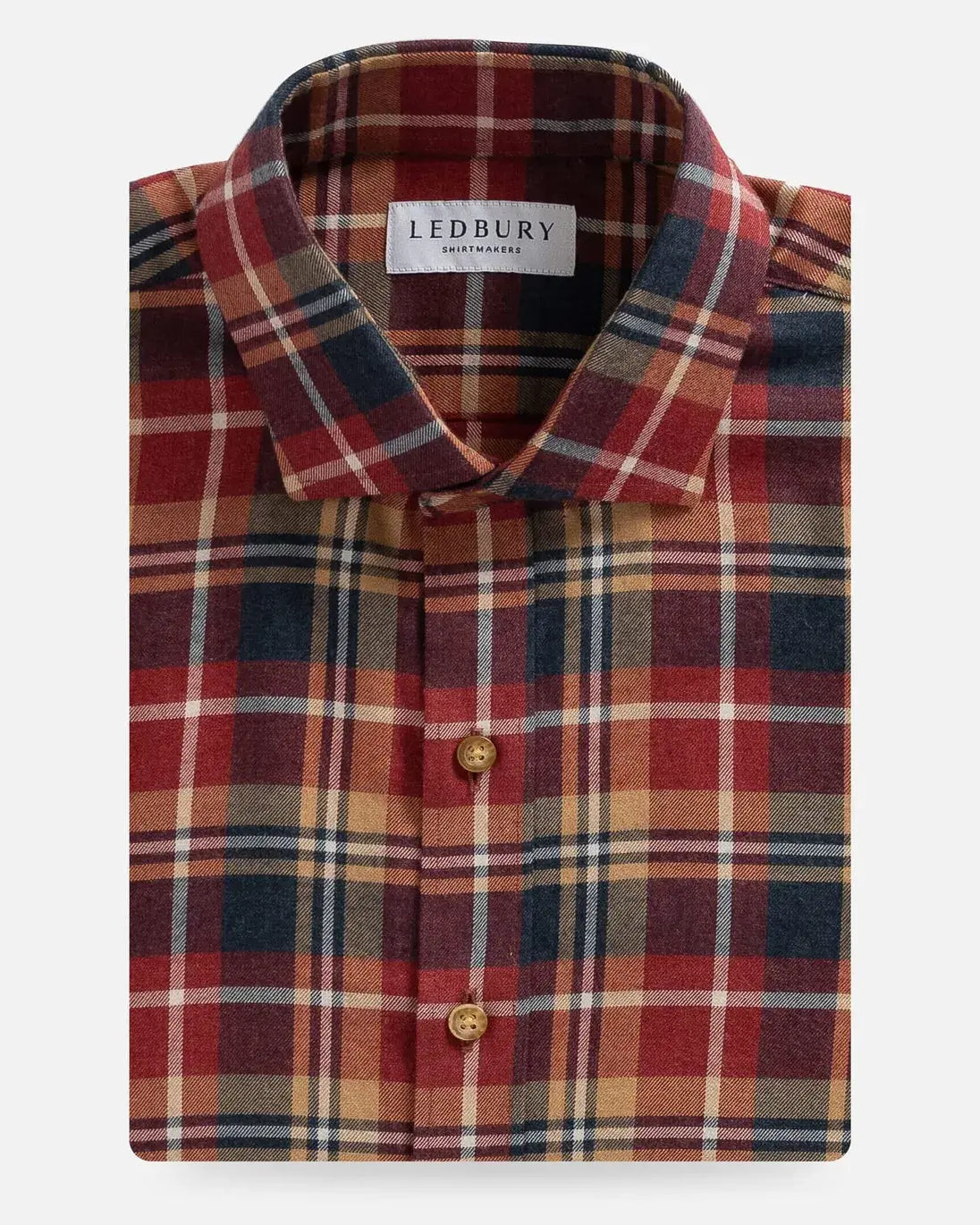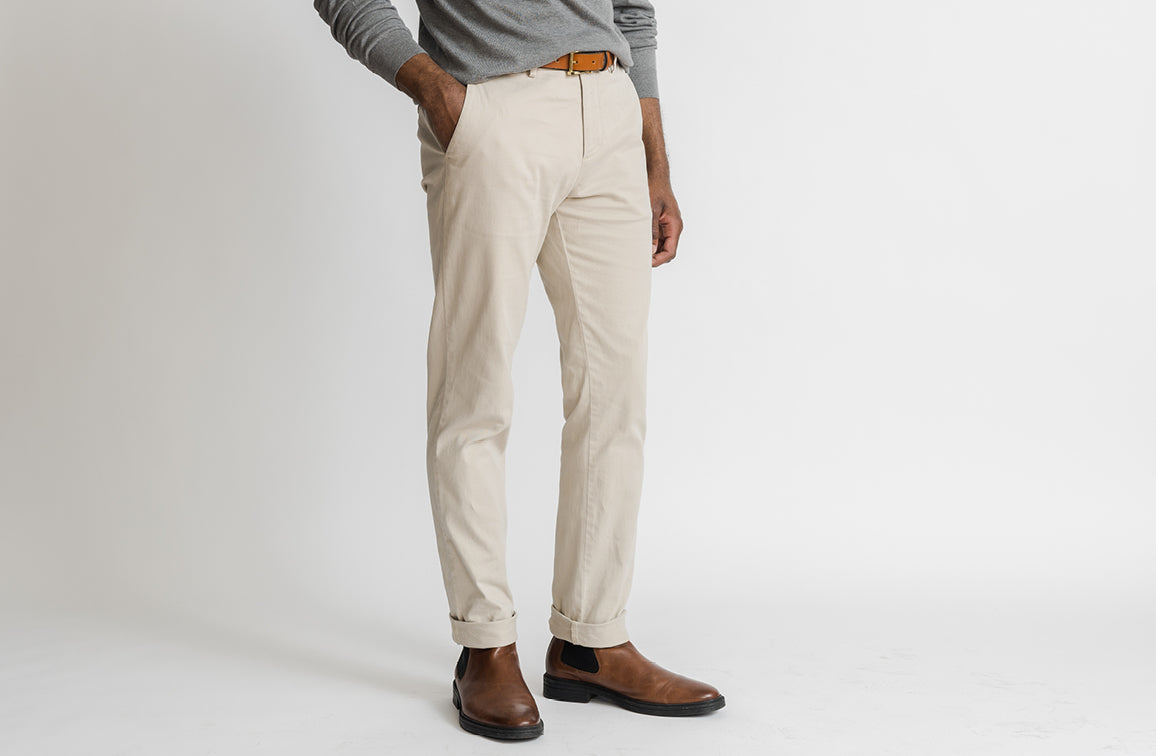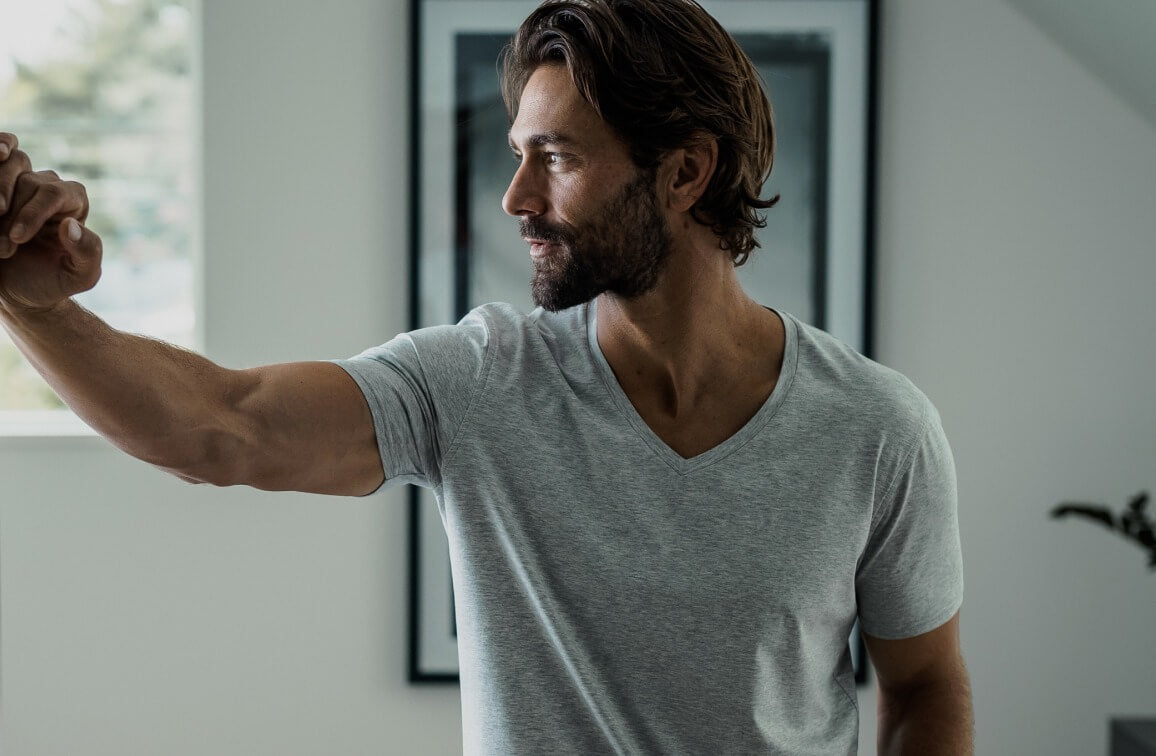




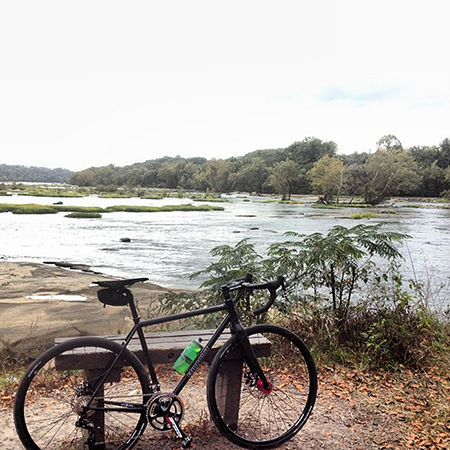

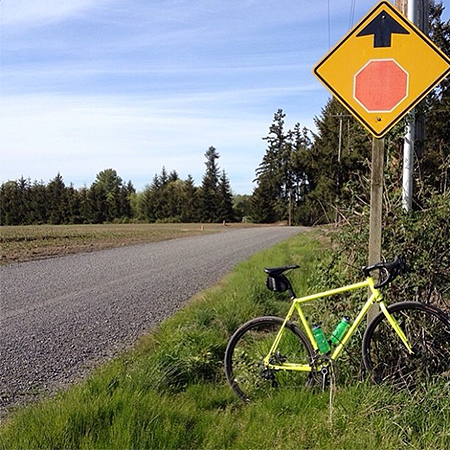



With the 2014 Cycling Collegiate Road Nationals taking place in Richmond this weekend, we talked with local entrepreneurs in the cycling world, Andy Stites and Braden Govoni of
Ride Endpoint - a brand focused on American-made steel bike frames and accessories for riders. We met Andy and Braden at
Carytown Bikes, where Braden is also one of the founders, for a conversation about building their brand, the ideal of the "lost boy," and the sense of culture found in the cycling community.
What made you want to build your own frames?
Braden: I've been in the bike industry since 2001 — working my way up from putting kids bikes together, to working on bikes, to managing half of a store, to owning my own store. When you're around stuff for that long, you form strong opinions about how things should work and ways they can be improved. A lot of it has been about wanting to build a better bike for the type of riding that I want to do personally. I had a custom bike built to this kind of design (similar to Ride Endpoint's Coffee Grinder) that worked really well. The more people I showed it to, the more positive feedback I got about some of the design characteristics. As we started to get more like-minds coming to the shop and seeing the kind of bikes we were building for ourselves and other customers, it started to get to the point where I was tired of piecing something together and not having a certain thing be the way I wanted it for this certain bike.
Andy: There was a definite need to improve upon a product that we liked. For me, one of the big things was that Carytown (
Carytown Bicycle Co.) as a brand was starting to get really strong, but it's region-specific. We had an idea to create something, using the shop as our grounding and test lab, where we could get feedback from our everyday customers who we actually interact with, and then design something that's more of a lifestyle brand that we could send out across the US and internationally. The thing with bike shops, and we champion this, is that you should buy a bike shop too — somewhere that can give you a community, that you can rely on to give you service if you can't do it yourself. But at the same time, we wanted to make a brand that could cross over outside of the brick-and-mortar realm and really take on a brand-self — have it's own opinion and not just try to cater to everyone, be more niche and be more into a specific lifestyle.
People form bonds with their bikes. How does it feel to be on the other end, to feel like you are creating that experience for someone else?
Andy: There's a lot of bike culture that's really surfacing now — people are actively commuting more and more. Cities the size of Richmond are seeing this growing need for a bike infrastructure. A brand like ours, for the type of riding that we want to do, breaks out of that structure, too. If you can mix getting where you need to go with also getting off the beaten path, that's where you're going to find a little more freedom and room to explore the fun of riding, because you're not so tuned in. It's not even about going somewhere that you haven't been — sometimes you don't even know where you're going. You're more in the now and connected to whatever you're doing instead of having a hundred different things around you that you're trying to control or react to. I feel like what we're trying to do is create this excuse to be a lost boy — to get dirty, to go wreck your bike — but there are no expectations.
What was your process like in terms of coming up with your concept and branding?
Braden: Because of Andy's history working on creative for the bike shop, we already had a really great working relationship on the creative side. We've collaborated on t-shirt designs, jerseys and stuff like that — so we already had this awesome working relationship where we could bounce ideas off of one another.
Andy: We have this weird, tennis telepathy happen. Something goes back and forth and then it's like, "Yeah! That's where I was going, too."
What was it like trying to decide on a name for the business?
Braden: It was about a 3 month process. One of our partners is a lawyer in trademark and patent law. So anytime we would come up with an idea, he'd check it and it would likely end up not working.
Andy: It was this roller coaster of us getting really excited about an idea. We really learned patience about not jumping into things too quickly, but reflecting on things and asking if they felt right. The process got us thinking more about the brand itself on the collective whole, and we had a much bigger idea of what it was going to look like afterwards, opposed to picking a name and letting that dictate everything. We tried some things out and everything kind of fell into place.
How did you decide on Ride Endpoint?
Braden: It's funny — "Ride Endpoint" wasn't actually our decision, but it was a necessary compromise. From a trademark standpoint, the word "endpoint" by itself was too broad… something where it had to be more specific or differentiated.
Andy: It's a happy accident. We put "Ride Endpoint" on everything because you can say "ride endpoint," as if it is the end of the ride. Or you can use "ride" as an active state — Ride “Endpoint," like the brand. In terms of legal filing, we put "Endpoint" on the bike and other stuff, but it's been nice to have "Ride Endpoint," because it's more of a call to action. That name worked out — and it got rid of the need for a tagline.
How long have you been working on Ride Endpoint?
Andy: We've technically been a company for a year, but we officially only launched last month. When we first started the business — after we knew what it was going to be called and we had gotten a business license, we had an aesthetic we wanted to go with — Braden had to work through designs and we had to get test models of the frame to see if it would actually
be different, or even be what we thought it was going to be. We worked on bags — we kept thinking we would launch January 1, 6 months in. People kept asking about the bikes. It was this rolling deadline, but we kept telling ourselves to be patient. I have learned to be insanely patient in letting it come together… we want this to last a long time, so we didn't want to force anything. Once we got the shirts to the printers, we got some bags here, we made sure we had photos and a good amount of people to share this with, then we launched an
Instagram and Braden started pumping that up. We would tag "
@RideEndpoint," but we didn't really pull the curtain down until we were ready.
Braden: We're still not really pumping it up, because we've learned to be patient with it — not to force anything to make it feel at all contrived, or make it feel unnatural. We're just guys making bikes the way we want to make bikes. It's not this crazy marketing thing, and I think people connect with that. A person who connects with the concept of the bike also connects to our approach to talking about the bike. This is something we're personally excited about — this isn't something we're just selling you.
What makes The Coffee Grinder different from other frames out there?
Braden: From my background in racing, I like the way fast, responsive bikes feel. There are very big differences in how a bike can feel and a lot of it comes down to very subtle things, like how long part of the frame is — 15mm can make a big difference in how a bike rides. It's hard to communicate those nuances to most people because we get kind of lost in the design-side sometimes. I wanted it to feel like a racing bike, but to be able to ride it wherever — something that was competent on any surface that could be
even slightly classified as road, but it had to be fast. Very few people in the industry are making this sort of thing. I don't want to tell people that they need another bike for a special thing that they'll use a few months out of the year. It's the desire that whoever buys this bike is going to reach of that bike first, no matter how many bikes they have in their garage for how many different tasks — I want them to reach for Endpoint first. That's what really drove the design.
Andy: There is some truth that a true cyclist or true cycling enthusiast is going to have a couple of frames that are truly purpose-specific, but we're coming at it from the approach of being a little more flexible without compromising.
Where do you see the brand going?
Andy: Most bike companies just make bikes. They make different types of bikes, but they aren't thinking about making the best add-on for this bike, or the best jacket to wear with this bike. That's where we saw an opportunity to be more niche — we're not just going to sell you the bike and tell you to call your bike shop if you need something. We're going to be there for your next upgrade or to design a new add-on.
You both ride and use your gear — how does that influence your product offering?
Andy: It's a natural connection — when we go out on a bike, that's the world we're in. Bikes really haven't changed in 100 years — it's the same kind of parts. Stuff gets lighter, but it works the same. At the same time, we're trying to keep progressing it and making it fresh opposed to looking at what the industry is doing and copying it. We want to find solutions and keep the product in this niche brand that feels authentic, because it's not for everybody. When brands try to appeal to everybody, it just becomes watered down. We want someone to think it's ridiculous to spend $150 on a waterproof bag for their bike, but we also want people that think you need a $400 one, who want to go to the middle of nowhere and need the most dependable stuff.
Braden: The polarizing aspect of thinking it's ridiculous or thinking it's awesome, that's when you're doing something right. I'm not going to change the way I look at stuff — whether it's the music I listen to, or the bikes I ride, or the clothes I wear, I'm always going to do things a certain way. Andy's always going to do things a certain way. And that unwillingness to compromise permeates our entire approach. We're not going to make a product that we can't manufacture in the United States. It's impossible to get bike tires made in the United States, so we're not going to make bike tires. That's not part of our ethic. We're going to do what we can to control as much of that process. I know the person who screens our shirts. I know the girl who makes our bags. I know the guy who makes our racks. That personal relationship is an important part of how we want to interact with people. We want to have positive connections, we want to trust people.
Bike shops are really about relationships. How do you bring that personal relationship with your vendors into the community?
Andy: In the same way we craft those relationships with the people who help us build our products and our company, we try to craft the same relationships with a customer. When we build these things, we look at how and why things work by using them in order to deliver the best product possible. The bags that we have now — we went through 3 or 4 versions because we use them and a few things didn't pan out the way we anticipated, so we made the necessary tweaks. Out of necessity, we're trying to get it right. We'll fail and make the mistakes on our end first.
Braden: I know from experience that the most successful companies in the industry, whether big or small, have some of that connection. They have a lunch ride with product designers, graphic designers, and brand managers, or something of the sort, and that shows. The biggest bike companies with the best, most dialed-in message and products are using the product themselves.
Andy: What's really cool about the structure of the company — we're the same employees of one entity doing something completely different. So even if we're not moving product or moving the business, we're moving a culture and an attitude. Whether we sell 100 bikes or a million, we're here with a solid foundation that we can work from. We're able to put a strong message out there and try to change people's minds, or confirm their beliefs. They don't have to be on an Endpoint out in the woods, as long as they're out there. But if they are on an Endpoint, it's all the better. After talking with Andy and Braden, we felt inspired to get outside and experience… everything. It truly is amazing to see the entrepreneurial spirit thriving in our hometown and we are thrilled to be able to share these stories and experiences with you.
Follow us on Instagram for photos from this weekend's 2014 Cycling Collegiate Road Nationals, and of course, for other Ledbury musings. And
follow Ride Endpoint on Instagram for updates on their brand and future releases.
Shop Ride Endpoint gear here.










 With the 2014 Cycling Collegiate Road Nationals taking place in Richmond this weekend, we talked with local entrepreneurs in the cycling world, Andy Stites and Braden Govoni of Ride Endpoint - a brand focused on American-made steel bike frames and accessories for riders. We met Andy and Braden at Carytown Bikes, where Braden is also one of the founders, for a conversation about building their brand, the ideal of the "lost boy," and the sense of culture found in the cycling community.
What made you want to build your own frames?
Braden: I've been in the bike industry since 2001 — working my way up from putting kids bikes together, to working on bikes, to managing half of a store, to owning my own store. When you're around stuff for that long, you form strong opinions about how things should work and ways they can be improved. A lot of it has been about wanting to build a better bike for the type of riding that I want to do personally. I had a custom bike built to this kind of design (similar to Ride Endpoint's Coffee Grinder) that worked really well. The more people I showed it to, the more positive feedback I got about some of the design characteristics. As we started to get more like-minds coming to the shop and seeing the kind of bikes we were building for ourselves and other customers, it started to get to the point where I was tired of piecing something together and not having a certain thing be the way I wanted it for this certain bike.
Andy: There was a definite need to improve upon a product that we liked. For me, one of the big things was that Carytown (Carytown Bicycle Co.) as a brand was starting to get really strong, but it's region-specific. We had an idea to create something, using the shop as our grounding and test lab, where we could get feedback from our everyday customers who we actually interact with, and then design something that's more of a lifestyle brand that we could send out across the US and internationally. The thing with bike shops, and we champion this, is that you should buy a bike shop too — somewhere that can give you a community, that you can rely on to give you service if you can't do it yourself. But at the same time, we wanted to make a brand that could cross over outside of the brick-and-mortar realm and really take on a brand-self — have it's own opinion and not just try to cater to everyone, be more niche and be more into a specific lifestyle.
People form bonds with their bikes. How does it feel to be on the other end, to feel like you are creating that experience for someone else?
Andy: There's a lot of bike culture that's really surfacing now — people are actively commuting more and more. Cities the size of Richmond are seeing this growing need for a bike infrastructure. A brand like ours, for the type of riding that we want to do, breaks out of that structure, too. If you can mix getting where you need to go with also getting off the beaten path, that's where you're going to find a little more freedom and room to explore the fun of riding, because you're not so tuned in. It's not even about going somewhere that you haven't been — sometimes you don't even know where you're going. You're more in the now and connected to whatever you're doing instead of having a hundred different things around you that you're trying to control or react to. I feel like what we're trying to do is create this excuse to be a lost boy — to get dirty, to go wreck your bike — but there are no expectations.
What was your process like in terms of coming up with your concept and branding?
Braden: Because of Andy's history working on creative for the bike shop, we already had a really great working relationship on the creative side. We've collaborated on t-shirt designs, jerseys and stuff like that — so we already had this awesome working relationship where we could bounce ideas off of one another.
Andy: We have this weird, tennis telepathy happen. Something goes back and forth and then it's like, "Yeah! That's where I was going, too."
What was it like trying to decide on a name for the business?
Braden: It was about a 3 month process. One of our partners is a lawyer in trademark and patent law. So anytime we would come up with an idea, he'd check it and it would likely end up not working.
Andy: It was this roller coaster of us getting really excited about an idea. We really learned patience about not jumping into things too quickly, but reflecting on things and asking if they felt right. The process got us thinking more about the brand itself on the collective whole, and we had a much bigger idea of what it was going to look like afterwards, opposed to picking a name and letting that dictate everything. We tried some things out and everything kind of fell into place.
How did you decide on Ride Endpoint?
Braden: It's funny — "Ride Endpoint" wasn't actually our decision, but it was a necessary compromise. From a trademark standpoint, the word "endpoint" by itself was too broad… something where it had to be more specific or differentiated.
Andy: It's a happy accident. We put "Ride Endpoint" on everything because you can say "ride endpoint," as if it is the end of the ride. Or you can use "ride" as an active state — Ride “Endpoint," like the brand. In terms of legal filing, we put "Endpoint" on the bike and other stuff, but it's been nice to have "Ride Endpoint," because it's more of a call to action. That name worked out — and it got rid of the need for a tagline.
How long have you been working on Ride Endpoint?
Andy: We've technically been a company for a year, but we officially only launched last month. When we first started the business — after we knew what it was going to be called and we had gotten a business license, we had an aesthetic we wanted to go with — Braden had to work through designs and we had to get test models of the frame to see if it would actually be different, or even be what we thought it was going to be. We worked on bags — we kept thinking we would launch January 1, 6 months in. People kept asking about the bikes. It was this rolling deadline, but we kept telling ourselves to be patient. I have learned to be insanely patient in letting it come together… we want this to last a long time, so we didn't want to force anything. Once we got the shirts to the printers, we got some bags here, we made sure we had photos and a good amount of people to share this with, then we launched an Instagram and Braden started pumping that up. We would tag "@RideEndpoint," but we didn't really pull the curtain down until we were ready.
Braden: We're still not really pumping it up, because we've learned to be patient with it — not to force anything to make it feel at all contrived, or make it feel unnatural. We're just guys making bikes the way we want to make bikes. It's not this crazy marketing thing, and I think people connect with that. A person who connects with the concept of the bike also connects to our approach to talking about the bike. This is something we're personally excited about — this isn't something we're just selling you.
What makes The Coffee Grinder different from other frames out there?
Braden: From my background in racing, I like the way fast, responsive bikes feel. There are very big differences in how a bike can feel and a lot of it comes down to very subtle things, like how long part of the frame is — 15mm can make a big difference in how a bike rides. It's hard to communicate those nuances to most people because we get kind of lost in the design-side sometimes. I wanted it to feel like a racing bike, but to be able to ride it wherever — something that was competent on any surface that could be even slightly classified as road, but it had to be fast. Very few people in the industry are making this sort of thing. I don't want to tell people that they need another bike for a special thing that they'll use a few months out of the year. It's the desire that whoever buys this bike is going to reach of that bike first, no matter how many bikes they have in their garage for how many different tasks — I want them to reach for Endpoint first. That's what really drove the design.
Andy: There is some truth that a true cyclist or true cycling enthusiast is going to have a couple of frames that are truly purpose-specific, but we're coming at it from the approach of being a little more flexible without compromising.
Where do you see the brand going?
Andy: Most bike companies just make bikes. They make different types of bikes, but they aren't thinking about making the best add-on for this bike, or the best jacket to wear with this bike. That's where we saw an opportunity to be more niche — we're not just going to sell you the bike and tell you to call your bike shop if you need something. We're going to be there for your next upgrade or to design a new add-on.
You both ride and use your gear — how does that influence your product offering?
Andy: It's a natural connection — when we go out on a bike, that's the world we're in. Bikes really haven't changed in 100 years — it's the same kind of parts. Stuff gets lighter, but it works the same. At the same time, we're trying to keep progressing it and making it fresh opposed to looking at what the industry is doing and copying it. We want to find solutions and keep the product in this niche brand that feels authentic, because it's not for everybody. When brands try to appeal to everybody, it just becomes watered down. We want someone to think it's ridiculous to spend $150 on a waterproof bag for their bike, but we also want people that think you need a $400 one, who want to go to the middle of nowhere and need the most dependable stuff.
Braden: The polarizing aspect of thinking it's ridiculous or thinking it's awesome, that's when you're doing something right. I'm not going to change the way I look at stuff — whether it's the music I listen to, or the bikes I ride, or the clothes I wear, I'm always going to do things a certain way. Andy's always going to do things a certain way. And that unwillingness to compromise permeates our entire approach. We're not going to make a product that we can't manufacture in the United States. It's impossible to get bike tires made in the United States, so we're not going to make bike tires. That's not part of our ethic. We're going to do what we can to control as much of that process. I know the person who screens our shirts. I know the girl who makes our bags. I know the guy who makes our racks. That personal relationship is an important part of how we want to interact with people. We want to have positive connections, we want to trust people.
Bike shops are really about relationships. How do you bring that personal relationship with your vendors into the community?
Andy: In the same way we craft those relationships with the people who help us build our products and our company, we try to craft the same relationships with a customer. When we build these things, we look at how and why things work by using them in order to deliver the best product possible. The bags that we have now — we went through 3 or 4 versions because we use them and a few things didn't pan out the way we anticipated, so we made the necessary tweaks. Out of necessity, we're trying to get it right. We'll fail and make the mistakes on our end first.
Braden: I know from experience that the most successful companies in the industry, whether big or small, have some of that connection. They have a lunch ride with product designers, graphic designers, and brand managers, or something of the sort, and that shows. The biggest bike companies with the best, most dialed-in message and products are using the product themselves.
Andy: What's really cool about the structure of the company — we're the same employees of one entity doing something completely different. So even if we're not moving product or moving the business, we're moving a culture and an attitude. Whether we sell 100 bikes or a million, we're here with a solid foundation that we can work from. We're able to put a strong message out there and try to change people's minds, or confirm their beliefs. They don't have to be on an Endpoint out in the woods, as long as they're out there. But if they are on an Endpoint, it's all the better. After talking with Andy and Braden, we felt inspired to get outside and experience… everything. It truly is amazing to see the entrepreneurial spirit thriving in our hometown and we are thrilled to be able to share these stories and experiences with you. Follow us on Instagram for photos from this weekend's 2014 Cycling Collegiate Road Nationals, and of course, for other Ledbury musings. And follow Ride Endpoint on Instagram for updates on their brand and future releases. Shop Ride Endpoint gear here.
With the 2014 Cycling Collegiate Road Nationals taking place in Richmond this weekend, we talked with local entrepreneurs in the cycling world, Andy Stites and Braden Govoni of Ride Endpoint - a brand focused on American-made steel bike frames and accessories for riders. We met Andy and Braden at Carytown Bikes, where Braden is also one of the founders, for a conversation about building their brand, the ideal of the "lost boy," and the sense of culture found in the cycling community.
What made you want to build your own frames?
Braden: I've been in the bike industry since 2001 — working my way up from putting kids bikes together, to working on bikes, to managing half of a store, to owning my own store. When you're around stuff for that long, you form strong opinions about how things should work and ways they can be improved. A lot of it has been about wanting to build a better bike for the type of riding that I want to do personally. I had a custom bike built to this kind of design (similar to Ride Endpoint's Coffee Grinder) that worked really well. The more people I showed it to, the more positive feedback I got about some of the design characteristics. As we started to get more like-minds coming to the shop and seeing the kind of bikes we were building for ourselves and other customers, it started to get to the point where I was tired of piecing something together and not having a certain thing be the way I wanted it for this certain bike.
Andy: There was a definite need to improve upon a product that we liked. For me, one of the big things was that Carytown (Carytown Bicycle Co.) as a brand was starting to get really strong, but it's region-specific. We had an idea to create something, using the shop as our grounding and test lab, where we could get feedback from our everyday customers who we actually interact with, and then design something that's more of a lifestyle brand that we could send out across the US and internationally. The thing with bike shops, and we champion this, is that you should buy a bike shop too — somewhere that can give you a community, that you can rely on to give you service if you can't do it yourself. But at the same time, we wanted to make a brand that could cross over outside of the brick-and-mortar realm and really take on a brand-self — have it's own opinion and not just try to cater to everyone, be more niche and be more into a specific lifestyle.
People form bonds with their bikes. How does it feel to be on the other end, to feel like you are creating that experience for someone else?
Andy: There's a lot of bike culture that's really surfacing now — people are actively commuting more and more. Cities the size of Richmond are seeing this growing need for a bike infrastructure. A brand like ours, for the type of riding that we want to do, breaks out of that structure, too. If you can mix getting where you need to go with also getting off the beaten path, that's where you're going to find a little more freedom and room to explore the fun of riding, because you're not so tuned in. It's not even about going somewhere that you haven't been — sometimes you don't even know where you're going. You're more in the now and connected to whatever you're doing instead of having a hundred different things around you that you're trying to control or react to. I feel like what we're trying to do is create this excuse to be a lost boy — to get dirty, to go wreck your bike — but there are no expectations.
What was your process like in terms of coming up with your concept and branding?
Braden: Because of Andy's history working on creative for the bike shop, we already had a really great working relationship on the creative side. We've collaborated on t-shirt designs, jerseys and stuff like that — so we already had this awesome working relationship where we could bounce ideas off of one another.
Andy: We have this weird, tennis telepathy happen. Something goes back and forth and then it's like, "Yeah! That's where I was going, too."
What was it like trying to decide on a name for the business?
Braden: It was about a 3 month process. One of our partners is a lawyer in trademark and patent law. So anytime we would come up with an idea, he'd check it and it would likely end up not working.
Andy: It was this roller coaster of us getting really excited about an idea. We really learned patience about not jumping into things too quickly, but reflecting on things and asking if they felt right. The process got us thinking more about the brand itself on the collective whole, and we had a much bigger idea of what it was going to look like afterwards, opposed to picking a name and letting that dictate everything. We tried some things out and everything kind of fell into place.
How did you decide on Ride Endpoint?
Braden: It's funny — "Ride Endpoint" wasn't actually our decision, but it was a necessary compromise. From a trademark standpoint, the word "endpoint" by itself was too broad… something where it had to be more specific or differentiated.
Andy: It's a happy accident. We put "Ride Endpoint" on everything because you can say "ride endpoint," as if it is the end of the ride. Or you can use "ride" as an active state — Ride “Endpoint," like the brand. In terms of legal filing, we put "Endpoint" on the bike and other stuff, but it's been nice to have "Ride Endpoint," because it's more of a call to action. That name worked out — and it got rid of the need for a tagline.
How long have you been working on Ride Endpoint?
Andy: We've technically been a company for a year, but we officially only launched last month. When we first started the business — after we knew what it was going to be called and we had gotten a business license, we had an aesthetic we wanted to go with — Braden had to work through designs and we had to get test models of the frame to see if it would actually be different, or even be what we thought it was going to be. We worked on bags — we kept thinking we would launch January 1, 6 months in. People kept asking about the bikes. It was this rolling deadline, but we kept telling ourselves to be patient. I have learned to be insanely patient in letting it come together… we want this to last a long time, so we didn't want to force anything. Once we got the shirts to the printers, we got some bags here, we made sure we had photos and a good amount of people to share this with, then we launched an Instagram and Braden started pumping that up. We would tag "@RideEndpoint," but we didn't really pull the curtain down until we were ready.
Braden: We're still not really pumping it up, because we've learned to be patient with it — not to force anything to make it feel at all contrived, or make it feel unnatural. We're just guys making bikes the way we want to make bikes. It's not this crazy marketing thing, and I think people connect with that. A person who connects with the concept of the bike also connects to our approach to talking about the bike. This is something we're personally excited about — this isn't something we're just selling you.
What makes The Coffee Grinder different from other frames out there?
Braden: From my background in racing, I like the way fast, responsive bikes feel. There are very big differences in how a bike can feel and a lot of it comes down to very subtle things, like how long part of the frame is — 15mm can make a big difference in how a bike rides. It's hard to communicate those nuances to most people because we get kind of lost in the design-side sometimes. I wanted it to feel like a racing bike, but to be able to ride it wherever — something that was competent on any surface that could be even slightly classified as road, but it had to be fast. Very few people in the industry are making this sort of thing. I don't want to tell people that they need another bike for a special thing that they'll use a few months out of the year. It's the desire that whoever buys this bike is going to reach of that bike first, no matter how many bikes they have in their garage for how many different tasks — I want them to reach for Endpoint first. That's what really drove the design.
Andy: There is some truth that a true cyclist or true cycling enthusiast is going to have a couple of frames that are truly purpose-specific, but we're coming at it from the approach of being a little more flexible without compromising.
Where do you see the brand going?
Andy: Most bike companies just make bikes. They make different types of bikes, but they aren't thinking about making the best add-on for this bike, or the best jacket to wear with this bike. That's where we saw an opportunity to be more niche — we're not just going to sell you the bike and tell you to call your bike shop if you need something. We're going to be there for your next upgrade or to design a new add-on.
You both ride and use your gear — how does that influence your product offering?
Andy: It's a natural connection — when we go out on a bike, that's the world we're in. Bikes really haven't changed in 100 years — it's the same kind of parts. Stuff gets lighter, but it works the same. At the same time, we're trying to keep progressing it and making it fresh opposed to looking at what the industry is doing and copying it. We want to find solutions and keep the product in this niche brand that feels authentic, because it's not for everybody. When brands try to appeal to everybody, it just becomes watered down. We want someone to think it's ridiculous to spend $150 on a waterproof bag for their bike, but we also want people that think you need a $400 one, who want to go to the middle of nowhere and need the most dependable stuff.
Braden: The polarizing aspect of thinking it's ridiculous or thinking it's awesome, that's when you're doing something right. I'm not going to change the way I look at stuff — whether it's the music I listen to, or the bikes I ride, or the clothes I wear, I'm always going to do things a certain way. Andy's always going to do things a certain way. And that unwillingness to compromise permeates our entire approach. We're not going to make a product that we can't manufacture in the United States. It's impossible to get bike tires made in the United States, so we're not going to make bike tires. That's not part of our ethic. We're going to do what we can to control as much of that process. I know the person who screens our shirts. I know the girl who makes our bags. I know the guy who makes our racks. That personal relationship is an important part of how we want to interact with people. We want to have positive connections, we want to trust people.
Bike shops are really about relationships. How do you bring that personal relationship with your vendors into the community?
Andy: In the same way we craft those relationships with the people who help us build our products and our company, we try to craft the same relationships with a customer. When we build these things, we look at how and why things work by using them in order to deliver the best product possible. The bags that we have now — we went through 3 or 4 versions because we use them and a few things didn't pan out the way we anticipated, so we made the necessary tweaks. Out of necessity, we're trying to get it right. We'll fail and make the mistakes on our end first.
Braden: I know from experience that the most successful companies in the industry, whether big or small, have some of that connection. They have a lunch ride with product designers, graphic designers, and brand managers, or something of the sort, and that shows. The biggest bike companies with the best, most dialed-in message and products are using the product themselves.
Andy: What's really cool about the structure of the company — we're the same employees of one entity doing something completely different. So even if we're not moving product or moving the business, we're moving a culture and an attitude. Whether we sell 100 bikes or a million, we're here with a solid foundation that we can work from. We're able to put a strong message out there and try to change people's minds, or confirm their beliefs. They don't have to be on an Endpoint out in the woods, as long as they're out there. But if they are on an Endpoint, it's all the better. After talking with Andy and Braden, we felt inspired to get outside and experience… everything. It truly is amazing to see the entrepreneurial spirit thriving in our hometown and we are thrilled to be able to share these stories and experiences with you. Follow us on Instagram for photos from this weekend's 2014 Cycling Collegiate Road Nationals, and of course, for other Ledbury musings. And follow Ride Endpoint on Instagram for updates on their brand and future releases. Shop Ride Endpoint gear here.

